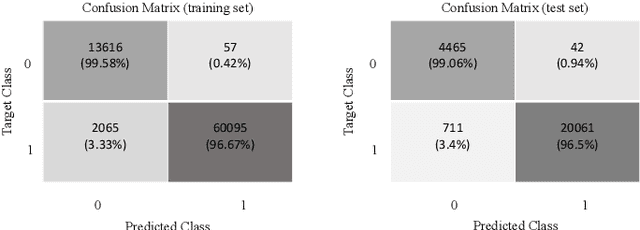Energy-Efficient Respiratory Anomaly Detection in Premature Newborn Infants
Paper and Code
Feb 21, 2022



Precise monitoring of respiratory rate in premature infants is essential to initiate medical interventions as required. Wired technologies can be invasive and obtrusive to the patients. We propose a Deep Learning enabled wearable monitoring system for premature newborn infants, where respiratory cessation is predicted using signals that are collected wirelessly from a non-invasive wearable Bellypatch put on infant's body. We propose a five-stage design pipeline involving data collection and labeling, feature scaling, model selection with hyperparameter tuning, model training and validation, model testing and deployment. The model used is a 1-D Convolutional Neural Network (1DCNN) architecture with 1 convolutional layer, 1 pooling layer and 3 fully-connected layers, achieving 97.15% accuracy. To address energy limitations of wearable processing, several quantization techniques are explored and their performance and energy consumption are analyzed. We propose a novel Spiking-Neural-Network(SNN) based respiratory classification solution, which can be implemented on event-driven neuromorphic hardware. We propose an approach to convert the analog operations of our baseline 1DCNN to their spiking equivalent. We perform a design-space exploration using the parameters of the converted SNN to generate inference solutions having different accuracy and energy footprints. We select a solution that achieves 93.33% accuracy with 18 times lower energy compared with baseline 1DCNN model. Additionally the proposed SNN solution achieves similar accuracy but with 4 times less energy.
 Add to Chrome
Add to Chrome Add to Firefox
Add to Firefox Add to Edge
Add to Edge